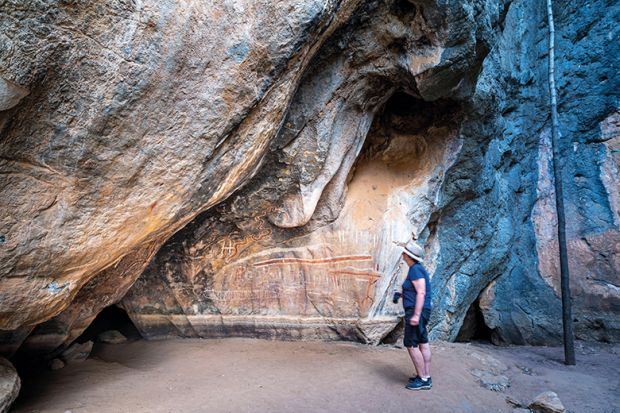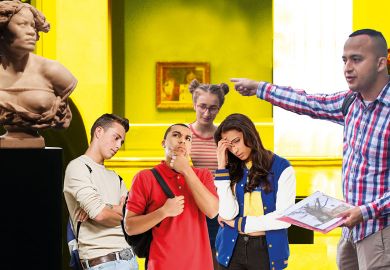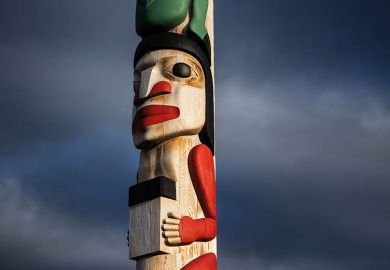Indigenous Australians’ cultural practices are underpinned by sophisticated mathematics that has been wilfully ignored by the discipline’s Western “gatekeepers”, according to the co-creator of a new Australian National University (ANU) programme called Mathematics without Borders.
In an article posted on ANU’s website, Rowena Ball says the often “non-numerical” traditions of Aboriginal peoples and Torres Strait Islanders deserve recognition as exercises in recognised mathematical fields – including computation, geometry, vectors and group theory – with applications in areas such as meteorology, navigation and astronomy.
Acknowledging indigenous mathematics could improve the accuracy of weather forecasting while rekindling enthusiasm for maths study, she says.
In the article, Professor Ball says a Western focus on numbers, arithmetic and accounting lies at odds with indigenous instincts for recognising and classifying patterns. “As most mathematicians know, mathematics is primarily the science of patterns and periodicities and symmetries,” she writes.
“One effect of colonisation of the curriculum is defensive protection of what is thought to be an exclusively European and British provenance of mathematics. Indigenous and first nations peoples around the world are standing up and saying: ‘Our knowledge is just as good as anybody else’s − why can’t we teach it to our children in our schools, and in our own way?’”
The article prompted a backlash on social media, with one critic noting that maths was supposed to be a “universal language” without nationalities. “Next: natural numbers are just colonialist-shaped opinions imposed by force,” he lamented.
US author and policy analyst David Rieff said the new course demonstrated “the conventional wisdom of a culture determined to commit intellectual suicide”.
But Rob Howse, professor of international law at New York University, said indigenous approaches had potential in sub-fields of physics where contemporary mathematics was struggling.
“Mathematics and physics are both about theorising space-time,” he wrote on X, formerly Twitter. “I wonder whether elements of indigenous math could articulate intuitions of quantum physicists on [the] shape [or] path of the universe? There may be payoffs for philosophy of physics and philosophy of math here too.”
In a preprint article co-authored with ANU colleague Hongzhang Xu, Professor Ball rebuts claims that indigenous Australian culture lacked maths because it had no written language, “coherent system of numerals” or measurements of time and space.
The paper argues that maths does not require written language and is often non-numeric, citing classification systems such as “high-medium-low”, “A-B-C-D” and “yes-no”.
It says indigenous people in Australia, New Guinea and Oceania produced nearly 900 counting systems, often based around two, five, 20, 27 or 35 rather than the mainstream base of 10.
The paper says Aboriginal practices demonstrating sophisticated maths include the prediction of solar eclipses, the use of “cardinal” directions, complex kinship rules, long-distance travel, understanding of tides that surpasses Galileo’s and weather predictions based on the colour of stars, the movement of sharks, the call of birds and the flowering of plants.
“Gatekeeper critiques…simply deny by ignoring, or attributing to chance, the mathematical thought and practice evidenced by these capacities,” the paper says. “Mathematics is a pan-cultural phenomenon and has many faces.”
Publisher Claire Lehmann said that, in hosting the new programme, ANU was “indulging the decolonial activist agenda” while claiming to provide a “rigorous and substantive” education. “If we accept the decolonial notion that no form of knowledge can be deemed superior to any other, then what exactly are students paying for?” Ms Lehmann wrote in The Australian.
University of Toronto mathematician Ed Barbeau said lifestyle factors had influenced the development of maths in different cultures. But “when a superior method of doing something comes along, it is generally adopted on its own merits no matter who you are”, he wrote. “To pretend that our present mathematics is an offshoot of colonialism is not only silly, but [could] harm the very people that we claim to help.”
Critics say the movement to decolonise the curriculum risks cultivating hostility towards the maths and science that underpin occupations such as engineering and medicine, to the detriment of indigenous students and their communities. Monash University mathematician Jessica Purcell disagreed.
“We’re already excluding lots of people,” said Professor Purcell, president of the Australian Mathematical Society. “People…are disengaged because they just don’t see themselves in it.”
Professor Purcell said mathematics was broader than many people realised and, while it contained universal truths, there were many different ways of articulating them.
“It may not be somebody typing on a calculator [but] these more indigenous cultures [are producing] similar conclusions. We may not understand the methods…but it’s still mathematics.”
Register to continue
Why register?
- Registration is free and only takes a moment
- Once registered, you can read 3 articles a month
- Sign up for our newsletter
Subscribe
Or subscribe for unlimited access to:
- Unlimited access to news, views, insights & reviews
- Digital editions
- Digital access to THE’s university and college rankings analysis
Already registered or a current subscriber?










